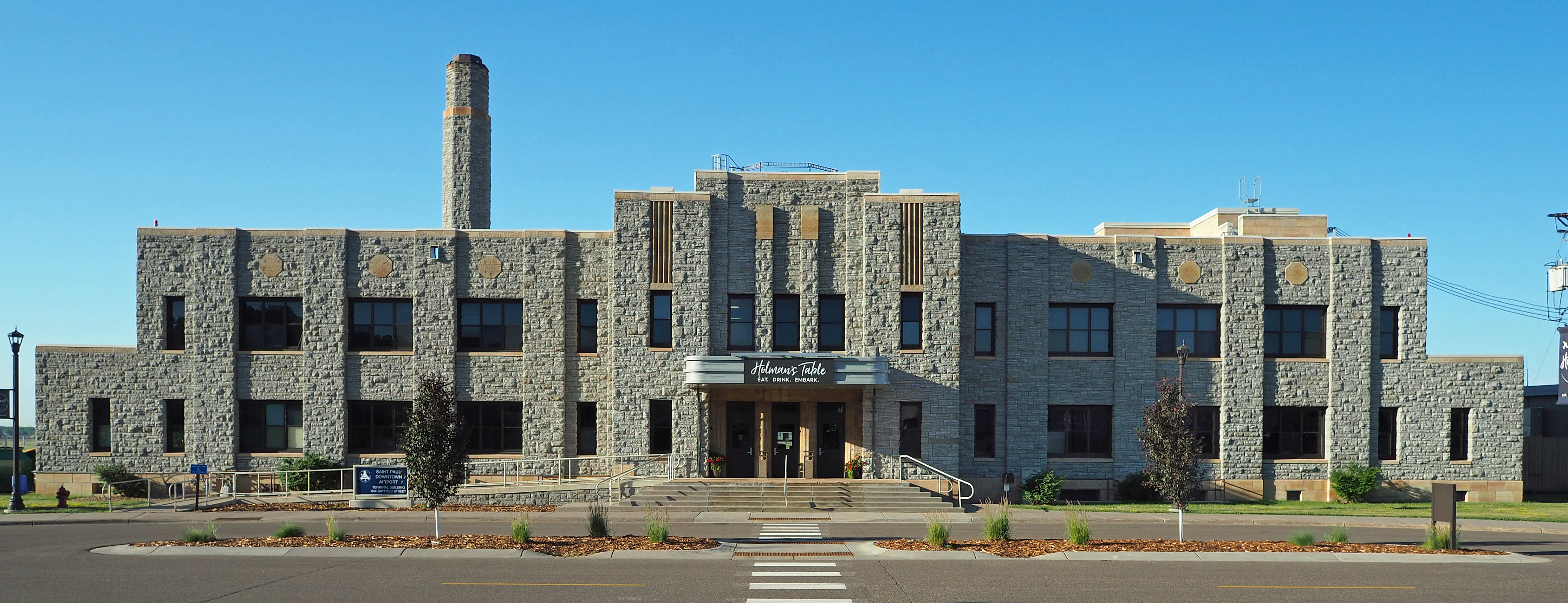Holman Field Administration Building on:
[Wikipedia]
[Google]
[Amazon]
The Holman Field Administration Building is a 
Kasota limestone
Kasota limestone or simply, Kasota stone, also called Mankato stone, is a dolomitic limestone found in southern Minnesota, especially near the Minnesota River and its tributaries. This sedimentary rock is part of the Oneota Dolomite of southern ...
building designed by Clarence Wigington
Clarence Wesley "Cap" Wigington (1883-1967) was an American architect who grew up in Omaha, Nebraska. After winning three first prizes in charcoal, pencil, and pen and ink at an art competition during the Trans-Mississippi Exposition in 1899, Wi ...
and built in 1939 by WPA
WPA may refer to:
Computing
*Wi-Fi Protected Access, a wireless encryption standard
*Windows Product Activation, in Microsoft software licensing
*Wireless Public Alerting (Alert Ready), emergency alerts over LTE in Canada
* Windows Performance Ana ...
employees. It serves as the control building for the St. Paul Downtown Airport
St. Paul Downtown Airport , also known as Holman Field, is an airport just across the Mississippi River from downtown Saint Paul, Minnesota. It is one of several reliever airports in the Twin Cities operated by the Metropolitan Airports Commissi ...
in Saint Paul
Paul; grc, Παῦλος, translit=Paulos; cop, ⲡⲁⲩⲗⲟⲥ; hbo, פאולוס השליח (previously called Saul of Tarsus;; ar, بولس الطرسوسي; grc, Σαῦλος Ταρσεύς, Saũlos Tarseús; tr, Tarsuslu Pavlus; ...
in the U.S.
The United States of America (U.S.A. or USA), commonly known as the United States (U.S. or US) or America, is a country primarily located in North America. It consists of 50 states, a federal district, five major unincorporated territor ...
state of Minnesota
Minnesota () is a state in the upper midwestern region of the United States. It is the 12th largest U.S. state in area and the List of U.S. states and territories by population, 22nd most populous, with over 5.75 million residents. Minne ...
. The airport was named for Charles W. Holman, who won the U.S. air speed trials in 1930. The airfield was built on the former site of Lamprey Lake, which was filled with dredged material from the adjacent Mississippi River
The Mississippi River is the second-longest river and chief river of the second-largest drainage system in North America, second only to the Hudson Bay drainage system. From its traditional source of Lake Itasca in northern Minnesota, it ...
, which regularly floods the airport. Across the river in Indian Mounds Park is one of the last remaining airway beacon
An airway beacon (US) or aerial lighthouse (UK and Europe) was a rotating light assembly mounted atop a tower. These were once used extensively in the United States for visual navigation by airplane pilots along a specified airway corridor ...
s in the country.
During World War II
World War II or the Second World War, often abbreviated as WWII or WW2, was a world war that lasted from 1939 to 1945. It involved the World War II by country, vast majority of the world's countries—including all of the great power ...
, Northwest Airlines
Northwest Airlines Corp. (NWA) was a major American airline founded in 1926 and absorbed into Delta Air Lines, Inc. by a merger. The merger, approved on October 29, 2008, made Delta the largest airline in the world until the American Airline ...
employed up to 5000 people at the site, modifying new B-24 Liberator
The Consolidated B-24 Liberator is an American heavy bomber, designed by Consolidated Aircraft of San Diego, California. It was known within the company as the Model 32, and some initial production aircraft were laid down as export models d ...
bombers, some of which received the highly classified H2X
H2X, officially known as the AN/APS-15, was an American ground scanning radar system used for blind bombing during World War II. It was a development of the British H2S radar, the first ground mapping radar to be used in combat. It was also known ...
radar
Radar is a detection system that uses radio waves to determine the distance ('' ranging''), angle, and radial velocity of objects relative to the site. It can be used to detect aircraft, ships, spacecraft, guided missiles, motor vehicles, w ...
, which proved to be an invaluable tool in the European theater.
A restaurant in the building is open to the general public, and allows viewing of the airfield.

References
External links
* {{National Register of Historic Places in Minnesota Air transportation buildings and structures on the National Register of Historic Places Buildings and structures completed in 1939 Clarence W. Wigington buildings Moderne architecture in Minnesota National Register of Historic Places in Saint Paul, Minnesota Works Progress Administration in Minnesota